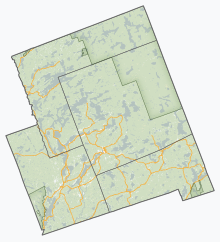Bicroft Mine
 The mine in 1956 | |
| Location | |
|---|---|
| Location | Cardiff |
| Province | Ontario |
| Country | Canada |
| Coordinates | 44°59′30.39″N 78°2′16.83″W / 44.9917750°N 78.0380083°W |
| Production | |
| Products | Uranium oxide |
| Production | 2,470,000 tonnes |
| History | |
| Opened | 1957 |
| Closed | 1963 |
| Owner | |
| Company | Barrick Gold |
Bicroft Mine is a decommissioned underground uranium mine, located near Bancroft, Ontario, Canada.
It is one of fourteen former uranium mines in Ontario that is monitored by the Canadian Nuclear Safety Commission, and one of twenty in Canada.
Aside from uranium, the mine has also produced globally renowned samples of Kainosite-(Y).
Location
Bicroft Mine is a decommissioned former underground uranium mine located near Highlands East (previously known as Cardiff), 19 kilometres (12 mi) southwest of Bancroft, Ontario, Canada.[1]
It is one of four former mines near Bancroft - the others being Faraday Mine/Madawaska Mine, Dyno Mine, and Greyhawk Mine).[2] It is also one of fourteen former uranium mines in Ontario that is monitored by the Canadian Nuclear Safety Commission, and one of twenty of such in Canada.[3]
Products
Aside from uranium, the mine has also produced globally renowned samples of Kainosite-(Y).[4]
Discovery of uranium - 1922 to 1953
Uranium was first discovered in the area of Cardiff in 1922 by W. M. Richardson. Between 1953 and 1956, one hundred area prospects were opened, including one by Central Lake Uranium Mines Limited that later turned into Bicroft Mine.[5]
Mining operations - 1953 to 1960
The mine operated from 1957 to 1963 and produced approximately 2,470,000 tonnes of uranium ore at an average concentration of 19 mg uranium per kg of ore.[6] The 2,284,421 tonnes of tailings are deposited in two impoundments near Cardiff:[2][7] Auger Lake and South Tailings Basin which flow into Paudash Lake.[1]
The mine employed up to 500 people at its peak.[8]
Bicroft Mine was originally owned by Bicroft Uranium Mines Limited,[9] and is now owned by Barrick Gold.[10][11][12]
Closure and decommissioning - 1960 to present day
Repairs to the decommissioned site, included adding vegetation over the tailings, were completed in 1980. Subsequent upgrades of the dams were completed in the 1990s.[11][7][13] The site is now a wetland.[1]
Water sampling completed by the Canadian Nuclear Safety Commission in 2019 confirmed that the site produces no risk to the environment or ecology.[11]
In September 2020, Barrick Gold requested to renew their waste nuclear substance license.[14] The Canadian Nuclear Safety Commission renewed the license on 24 February2021.[14] The license will expire on 29 February 2036.[14]
See also
- Uranium mining in the Bancroft area
- Uranium ore deposits
- List of uranium mines
- Uranium mining
- List of mines in Ontario
References
- ^ a b c Canada, Library and Archives (2019-03-08). "Search - Theses Canada". www.bac-lac.gc.ca. Retrieved 2021-11-22.
- ^ a b "Characterization of uranium and rare earth element mobility and attenuation downstream of decomissioned [sic] tailings impoundments at the Bicroft Uranium Mine near Bancroft, Ontario - ProQuest". www.proquest.com. Retrieved 2021-11-22.
- ^ "Uranium mines and mills waste". Canadian Nuclear Safety Commission. 2014-02-03. Archived from the original on 2014-02-27. Retrieved 2021-11-22.
- ^ McDougall, Raymond (2019-09-03). "Mineral Highlights from the Bancroft Area, Ontario, Canada". Rocks & Minerals. 94 (5): 408–419. doi:10.1080/00357529.2019.1619134. ISSN 0035-7529. S2CID 201298402.
- ^ Reynolds, Nila (1979). Bancroft. A Bonanza of Memories. Bancroft Centennial Committee. p. 192.
- ^ Parsons, Michael B.; Friske, Peter W. B.; Laidlow, Allison M.; Jamieson, Heather E. (2014). "Abstract: Controls on Uranium, Rare Earth Element, and Radionuclide Mobility at the Decommissioned Bicroft Uranium Mine, Ontario".
{{cite journal}}: Cite journal requires|journal=(help) - ^ a b "Independent Environmental Monitoring Program: Dyno, Bicroft, and Madawaska Mines". Canadian Nuclear Safety Commission. 2020-09-21. Archived from the original on 2020-11-01. Retrieved 2021-11-22.
- ^ "Uranium Citizens Inquiry". www.uraniumcitizensinquiry.com. Retrieved 2021-11-22.
- ^ Evans, A. M. (1966-12-01). "The development of lit-par-lit gneiss at the Bicroft uranium mine, Ontario". The Canadian Mineralogist. 8 (5): 593–609. ISSN 0008-4476.
- ^ "3 decommissioned uranium mines near Bancroft, Ont. deemed protected, no health impacts: study - Peterborough | Globalnews.ca". Global News. Retrieved 2021-11-22.
- ^ a b c "Sampling near old mine sites finds 'no expected health impacts'". Haliburton Echo. 2020-10-06. Retrieved 2021-11-22.
- ^ Smith-Millar, Trevor (2020-10-15). "Old Uranium Mines in Bancroft Area Deemed Safe". My Bancroft Now. Retrieved 2021-11-22.
- ^ "Subsurface Investigations and Condition of Dams: Bicroft Mine Site Bancroft, Ontario · U-Links Centre For Community Based Research". database.ulinks.ca. Retrieved 2021-11-22.
- ^ a b c "Regulatory Oversight Report for Uranium Mines, Mills, Historic, and Decommissioned Sites in Canada: 2020" (PDF). Canadian Nuclear Safety Commission: 160.



